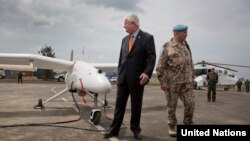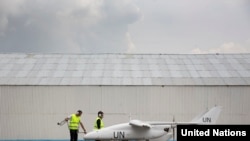The United Nations has begun deploying its first drones to gather intelligence about rebel groups in the eastern Democratic Republic of Congo (DRC). Analysts have mixed views on how effective the surveillance drones will be in helping peacekeepers curb unrest in a country that has been ravaged by fighting for years.
At a ceremony marking the launch of the first two of five drones that will eventually patrol the DRC, U.N. peacekeeping chief Herve Ladsous said his forces needed to get a better picture of what was happening with armed groups, refugees and displaced persons.
"This will be a tool of choice for improving the information of the mission," said Ladsous.
U.N. peacekeepers will use the drones to watch over the mineral rich eastern region, near the borders with Rwanda and Uganda.
The aerial surveillance is starting less than a month after one rebel group announced it was laying down its arms.
The M23 rebels gave up their fight after the Congolese army captured their last strongholds with the help of a special U.N. intervention force.
New York University Center on International Cooperation Research Director Richard Gowan says until recently, the U.N. mission had been losing credibility because it did not appear to have a long-term strategy for stabilizing the DRC.
"It is truly astonishing that the U.N. is only now mainstreaming drones in one of its most significant peace operations, and it has taken the U.N. a whole year, in effect, to get its first drone in the air over the eastern Congo," said Gowan.
Gowan adds the peacekeeping force needs to step up its reaction to conflict.
"The U.N. has to move quickly in terms of using new technology for peacekeeping because otherwise it is simply going to be left behind by rebel groups and armies," he said.
Analyst Philipp Rotmann of Germany's Global Public Policy Institute says the drones will be useful to the peacekeeping mission, but cannot be viewed as a panacea for the country's problems.
"Only a few drones over a huge area. Drones need maintenance. Drones need to refuel. There will be a limited amount of visibility," said Rotmann.
He says expectations that the use of drones will automatically increase the safety of civilians would be unrealistic.
But John Villasenor of the Brookings Institution says the drones will be a useful tool for peacekeepers in the vast, rugged regions of the DRC.
"Anytime you have the ability to get overhead aerial imagery, it obviously increases the amount of information you have," said Villasenor.
The United Nations plans to deploy three more drones in the DRC in the coming months.
At a ceremony marking the launch of the first two of five drones that will eventually patrol the DRC, U.N. peacekeeping chief Herve Ladsous said his forces needed to get a better picture of what was happening with armed groups, refugees and displaced persons.
"This will be a tool of choice for improving the information of the mission," said Ladsous.
U.N. peacekeepers will use the drones to watch over the mineral rich eastern region, near the borders with Rwanda and Uganda.
The aerial surveillance is starting less than a month after one rebel group announced it was laying down its arms.
The M23 rebels gave up their fight after the Congolese army captured their last strongholds with the help of a special U.N. intervention force.
New York University Center on International Cooperation Research Director Richard Gowan says until recently, the U.N. mission had been losing credibility because it did not appear to have a long-term strategy for stabilizing the DRC.
"It is truly astonishing that the U.N. is only now mainstreaming drones in one of its most significant peace operations, and it has taken the U.N. a whole year, in effect, to get its first drone in the air over the eastern Congo," said Gowan.
Gowan adds the peacekeeping force needs to step up its reaction to conflict.
"The U.N. has to move quickly in terms of using new technology for peacekeeping because otherwise it is simply going to be left behind by rebel groups and armies," he said.
Analyst Philipp Rotmann of Germany's Global Public Policy Institute says the drones will be useful to the peacekeeping mission, but cannot be viewed as a panacea for the country's problems.
"Only a few drones over a huge area. Drones need maintenance. Drones need to refuel. There will be a limited amount of visibility," said Rotmann.
He says expectations that the use of drones will automatically increase the safety of civilians would be unrealistic.
But John Villasenor of the Brookings Institution says the drones will be a useful tool for peacekeepers in the vast, rugged regions of the DRC.
"Anytime you have the ability to get overhead aerial imagery, it obviously increases the amount of information you have," said Villasenor.
The United Nations plans to deploy three more drones in the DRC in the coming months.





